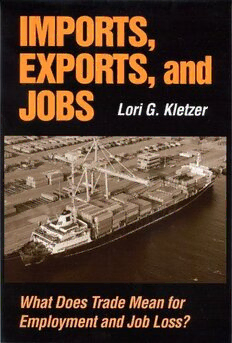
Imports, Exports, and Jobs: What Does Trade Mean for Employment and Job Loss? PDF
233 Pages·2002·0.625 MB·English
Most books are stored in the elastic cloud where traffic is expensive. For this reason, we have a limit on daily download.
Preview Imports, Exports, and Jobs: What Does Trade Mean for Employment and Job Loss?
Description:
Kletzer adds to our understanding of the magnitude of the costs and benefits of free trade. She presents a focused examination of the relationship between changes in international trade, employment, and job displacement for a sample of U.S. manufacturing industries. The link between international trade and domestic jobs is also explored through studies of both net and gross employment job change. The book begins with a discussion of international trade theory and empirical measures of the intensity of foreign competition and then provides a useful review of the relevant literature. Next, Kletzer offers a descriptive analysis of the relevant data from the years 1979-1994, followed by an econometric analysis of employment change, job loss, and international trade. The descriptive data reveal that sharply declining exports are strongly associated with employment decline, particularly in industries accounting for the bulk of manufacturing sector employment loss. Rising imports are also strongly associated with employment decline, but typically in smaller industries that are traditionally import-competing. Patterns found in the descriptive analysis are reexamined in the econometric analysis. With respect to changes in industry employment, the results are consistent with arguments that increasing imports reduce employment and that increasing exports (and domestic demand) enhance employment. Within an industry on a year-to-year basis, rising exports are more strongly associated with employment growth than are increases in domestic demand. Rising import share is associated with a higher displacement rate, but the effect is small and imprecisely estimated. Looking within an industry, the effect of rising import share on the risk of job loss is notably smaller than the cross-industry effect. This finding suggests that there might be a strong relationship between rising import share and job loss for a subset of industries, but a much weaker one for all manufacturing industries. The relatively small effects reported indicate that reducing import share will not significantly boost employment or reduce job displacement, and consumers will likely bear the cost through higher prices. For some industries, however, where the link between job loss and increasing imports is strong, displaced workers are likely to suffer. Kletzer feels that protecting these workers is an obligation of proponents of freer trade, and that this can be accomplished through a variety of domestic adjustment assistance policies, which she proposes.
See more
The list of books you might like
Most books are stored in the elastic cloud where traffic is expensive. For this reason, we have a limit on daily download.
